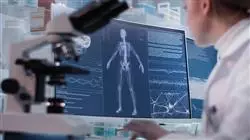University certificate
The world's largest faculty of medicine”
Introduction to the Program
Thanks to the use of AI in Data Analysis, you will be able to personalize treatments and develop more effective therapies, thereby contributing to the advancement of medicine”

The application of Artificial Intelligence (AI) in clinical data analysis has revolutionized the healthcare field. Its ability to process large volumes of data quickly and accurately facilitates the identification of complex patterns and correlations in sets of clinical information. In addition, it enables the integration of heterogeneous data, such as electronic medical records, medical images and genomic data, providing a comprehensive and holistic view of patients' health.
For these reasons, TECH has developed this Postgraduate diploma in Data Analysis with Artificial Intelligence in Clinical Research, a comprehensive program that will provide the clinician with a detailed view of Artificial Intelligence, focusing on machine learning and its specific implementation in clinical and biomedical Data Analysis. From natural language processing to the use of neural networks in biomedical research, advanced data visualization tools, platforms and techniques will be analyzed.
The graduate will also apply AI in the simulation of biological processes, the generation of synthetic data sets and the scientific and clinical validation of the resulting models. In addition, they will delve into the analysis of molecular interactions, modeling of complex diseases and other crucial issues, such as ethics and regulations associated with the use of synthetic data.
Similarly, this program will focus on the implementation of Big Data and machine learning techniques in clinical research, delving into data mining in clinical registries, as well as the application of AI models in epidemiology and biological network analysis.
Therefore, TECH has implemented a program based on the avant-garde Relearning methodology, focused on the repetition of essential concepts to guarantee an optimal understanding of the syllabus. In fact, the 100% online modality will allow students to access the contents through any electronic device with an Internet connection.
You will discover significant trends in the response to various treatments, as well as the prediction of clinical outcomes, all thanks to this 100% online program"
This Postgraduate diploma in Data Analysis with Artificial Intelligence in Clinical Research contains the most complete and up-to-date scientific program on the market. Its most notable features are:
- The development of case studies presented by experts in Data Analysiswith AI in Clinical Research
- The graphic, schematic and practical contents with which it is conceived scientific and practical information on those disciplines that are essential for professional practice
- Practical exercises where self-assessment can be used to improve learning
- Its special emphasis on innovative methodologies
- Theoretical lessons, questions to the expert, debate forums on controversial topics, and individual reflection assignments
- Content that is accessible from any fixed or portable device with an Internet connection
You will delve into drug and treatment simulation as part of AI's contribution to health research"
The program’s teaching staff includes professionals from the sector who contribute their work experience to this program, as well as renowned specialists from leading societies and prestigious universities.
The multimedia content, developed with the latest educational technology, will provide the professional with situated and contextual learning, i.e., a simulated environment that will provide immersive education programmed to learn in real situations.
This program is designed around Problem-Based Learning, whereby the professional must try to solve the different professional practice situations that arise during the course. For this purpose, the students will be assisted by an innovative interactive video system created by renowned and experienced experts.
You will face the challenges associated with the management of large datasets, information security and practical applications of Big Data in the biomedical field"

You will develop strategies to benefit from AI and optimize clinical research, through the most innovative multimedia resources"
Why study at TECH?
TECH is the world’s largest online university. With an impressive catalog of more than 14,000 university programs available in 11 languages, it is positioned as a leader in employability, with a 99% job placement rate. In addition, it relies on an enormous faculty of more than 6,000 professors of the highest international renown.

Study at the world's largest online university and guarantee your professional success. The future starts at TECH”
The world’s best online university according to FORBES
The prestigious Forbes magazine, specialized in business and finance, has highlighted TECH as “the world's best online university” This is what they have recently stated in an article in their digital edition in which they echo the success story of this institution, “thanks to the academic offer it provides, the selection of its teaching staff, and an innovative learning method aimed at educating the professionals of the future”
A revolutionary study method, a cutting-edge faculty and a practical focus: the key to TECH's success.
The most complete study plans on the university scene
TECH offers the most complete study plans on the university scene, with syllabuses that cover fundamental concepts and, at the same time, the main scientific advances in their specific scientific areas. In addition, these programs are continuously being updated to guarantee students the academic vanguard and the most in-demand professional skills. In this way, the university's qualifications provide its graduates with a significant advantage to propel their careers to success.
TECH offers the most comprehensive and intensive study plans on the current university scene.
A world-class teaching staff
TECH's teaching staff is made up of more than 6,000 professors with the highest international recognition. Professors, researchers and top executives of multinational companies, including Isaiah Covington, performance coach of the Boston Celtics; Magda Romanska, principal investigator at Harvard MetaLAB; Ignacio Wistumba, chairman of the department of translational molecular pathology at MD Anderson Cancer Center; and D.W. Pine, creative director of TIME magazine, among others.
Internationally renowned experts, specialized in different branches of Health, Technology, Communication and Business, form part of the TECH faculty.
A unique learning method
TECH is the first university to use Relearning in all its programs. It is the best online learning methodology, accredited with international teaching quality certifications, provided by prestigious educational agencies. In addition, this disruptive educational model is complemented with the “Case Method”, thereby setting up a unique online teaching strategy. Innovative teaching resources are also implemented, including detailed videos, infographics and interactive summaries.
TECH combines Relearning and the Case Method in all its university programs to guarantee excellent theoretical and practical learning, studying whenever and wherever you want.
The world's largest online university
TECH is the world’s largest online university. We are the largest educational institution, with the best and widest online educational catalog, one hundred percent online and covering the vast majority of areas of knowledge. We offer a large selection of our own degrees and accredited online undergraduate and postgraduate degrees. In total, more than 14,000 university degrees, in eleven different languages, make us the largest educational largest in the world.
TECH has the world's most extensive catalog of academic and official programs, available in more than 11 languages.
Google Premier Partner
The American technology giant has awarded TECH the Google Google Premier Partner badge. This award, which is only available to 3% of the world's companies, highlights the efficient, flexible and tailored experience that this university provides to students. The recognition as a Google Premier Partner not only accredits the maximum rigor, performance and investment in TECH's digital infrastructures, but also places this university as one of the world's leading technology companies.
Google has positioned TECH in the top 3% of the world's most important technology companies by awarding it its Google Premier Partner badge.
The official online university of the NBA
TECH is the official online university of the NBA. Thanks to our agreement with the biggest league in basketball, we offer our students exclusive university programs, as well as a wide variety of educational resources focused on the business of the league and other areas of the sports industry. Each program is made up of a uniquely designed syllabus and features exceptional guest hosts: professionals with a distinguished sports background who will offer their expertise on the most relevant topics.
TECH has been selected by the NBA, the world's top basketball league, as its official online university.
The top-rated university by its students
Students have positioned TECH as the world's top-rated university on the main review websites, with a highest rating of 4.9 out of 5, obtained from more than 1,000 reviews. These results consolidate TECH as the benchmark university institution at an international level, reflecting the excellence and positive impact of its educational model.” reflecting the excellence and positive impact of its educational model.”
TECH is the world’s top-rated university by its students.
Leaders in employability
TECH has managed to become the leading university in employability. 99% of its students obtain jobs in the academic field they have studied, within one year of completing any of the university's programs. A similar number achieve immediate career enhancement. All this thanks to a study methodology that bases its effectiveness on the acquisition of practical skills, which are absolutely necessary for professional development.
99% of TECH graduates find a job within a year of completing their studies.
Postgraduate Diploma in Data Analysis with Artificial Intelligence in Clinical Research
Clinical research has experienced an unprecedented revolution thanks to the convergence between data analysis and Artificial Intelligence (AI). Would you like to specialize in this field? TECH Global University has the ideal option for you: the Postgraduate Diploma in Data Analysis with Artificial Intelligence in Clinical Research. This program, taught in online mode, will immerse you in a fascinating journey where you will explore how AI revolutionizes the way we analyze and interpret data in the field of clinical research. As you progress through the syllabus, you will lay the foundation necessary to understand the fundamental principles of data analytics. From data collection and data cleaning, to the application of traditional statistical techniques, this module provides the essential foundation for addressing the specific challenges of clinical research. In addition, you will discover the transformative potential of Artificial Intelligence in clinical data analysis. In this way, you will be able to make a significant contribution to the progress of medicine.
Learn all about AI data analysis in clinical research
Motivated to facilitate your learning process, we divide the concepts of the syllabus into dynamic modules supported by telepractice. In this way, you will explore key concepts such as machine learning, neural networks and AI algorithms applied to medical research. You will learn how to use popular tools and libraries to implement AI models and extract valuable information from complex datasets. In addition, you will address the ethical and legal principles associated with the use of clinical data, ensuring you understand and apply best practices to protect the privacy and confidentiality of patient information. Finally, you will explore the latest trends in data analysis with AI in clinical research and understand emerging challenges, from multi-omics data integration, to interpreting complex AI models; preparing you to address the ongoing changes and advances in the field. Upon completion, you will be equipped with the skills necessary to tackle complex problems in clinical research, using AI as a powerful tool to drive scientific advancement. Enroll now and learn how to transform data into knowledge!







